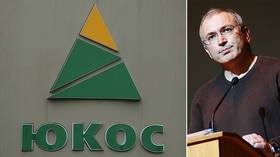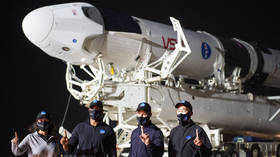Yukos case: Netherlands prepares for hearing in $50 billion plus legal battle over disgraced ex-oligarch’s former oil empire

Russia is contesting the world’s largest arbitration award in the Supreme Court of the Netherlands as a fifteen-year battle over assets from what was once the country’s biggest oil company comes to a head.
In February, a Dutch appeals court upheld previous awards from the Energy Charter Treaty tribunal and ordered Moscow to pay $50 billion plus interest to Yukos’ former shareholders after the Russian government took action on fraud and tax evasion charges in 2003. Russia’s claims were largely viewed as “expropriation” of Yukos’ assets – something that Moscow strenuously denies.
In the meantime, the country’s lawyers asked top Dutch judges to intervene and suspend the decision, and the Supreme Court began to hear respective oral arguments earlier this month. The lower court, they allege, failed to consider the company’s breaches of anti-corruption laws and that those who would stand to gain from the settlement are neither “bona fide” nor “foreign” investors protected by the European Energy Charter Treaty. Russia contests the murky circumstances in which the company was acquired, and the network of shell companies controlled by the Yukos oligarchs that have brought the claims.
Also on rt.com Investigation launched into claims that employees of ex-oligarch Mikhail Khodorkovsky’s media group took part in 2014 gang rapeAs the case for compensation for Yukos’ shareholders has dragged on, it has exposed tensions between Russian and international law. Although Moscow was initially a signatory to the Energy Charter Treaty, Russia never ratified it and applied it only provisionally. Moreover, like in many other Western countries, Russia’s recent constitutional amendments gave the Russian Constitutional Court the power to review judgements of foreign and international judicial bodies.
The biggest award in history
The $50 billion plus sum makes the case the most significant arbitration in history, anywhere in the world. The total proposed settlement is similar to a year of Russian defense spending. Given that the Kremlin has focused on reducing debt to historic lows, haunted by historic experiences of spiraling inflation and crippling loan repayments, shouldering a settlement of this size has obvious consequences.
Also on rt.com Netherlands Supreme Court accepts Russia’s appeal of $57 BILLION verdict in favor of ex-Yukos shareholdersThe legal battle also comes as relations between Moscow and the European Union continue to fray. In October, Foreign Minister Sergey Lavrov hit out at growing tensions with Western states, saying “we probably simply have to temporarily stop talking to those people in the West who are responsible for foreign policy and don’t understand the need for mutually respectful dialogue.”
The spat may deepen the Kremlin’s disillusionment with the European Union, building on suspicions that the bloc is irredeemably anti-Russian.
The rise of the Yukos empire
Yukos was among a number of business giants that emerged from the market reforms that started under Mikhail Gorbachev in the 1980s but accelerated in earnest in the 1990s, as then President Boris Yeltsin moved to liberalize the economy. It became the crowning jewel of controversial oligarch Mikhail Khodorkovsky’s business empire as what came to be known as the ‘Loans for Shares’ scheme saw vast swathes of state assets snapped up for a song. This and similar auctions led directly to the creation of an oligarch class in Russia.
A series of these economic reforms, and the increase in political autonomy offered to its constituent republics, started a series of events that broke the Soviet Union apart. In 1991, armed forces, backed by communist hardliners, moved to wrestle control from Gorbachev’s government with a military assault on Moscow’s White House. In iconic scenes that would propel him into the post of president of the newly independent Russian Federation, Yeltsin, astride a tank, rallied popular support against the coup.
As one political system gave way to another, Khodorkovsky’s political affiliations and business credentials gave him a unique vantage point, and he was enlisted into Yeltsin’s first government as an economic adviser. The rapid market reforms, or ‘shock therapy’ as it was known, that Yeltsin’s team championed meant millions of Russians lost their life savings almost overnight. Entire industries grounded to a halt and poverty quickly rose.
But it also created opportunities for men like Khodorkovsky, as the government moved to sell off state companies and their assets to prop up the economy. Yukos was one such company, formed from oil operations in Siberia and Samara, and packaged for sale. The economic chaos that defined the period created an effective free-for-all and, in a rigged auction, Khodorkovsky and his companions bought the company for a mere $170 million. Its true value at the time was estimated to be around $5 billion, leading one economic adviser to describe the sale as “the swindle of the century.”
The details of the auction have remained murky, but such sell-offs were known to be commonplace in the era. The banks which acted as supposedly impartial middlemen for bids were often owned and influenced by the oligarchs making the bids.
Yukos’ former majority shareholders include a number of highly influential business leaders such as Leonid Nevzlin, who served as vice president of the company until its bankruptcy. Nevzlin took on the role after the Menatep Bank, which he headed up, and acquired a substantial share in the oil company. If the Dutch court’s decision is upheld, Nevzlin would stand to be the single biggest beneficiary.
It has been reported previously that he and other shareholders have explored pressing US and European governments to confiscate Russian assets if the government were to refuse to pay damages.
The collapse of Yukos
At its height, Yukos produced 20 percent of Russia’s oil, making it one of the world’s largest businesses. The company, formed from the privatization of state industries after the fall of the Soviet Union, was the crown jewel of the controversial oligarch's business empire. Khodorkovsky was widely regarded as Russia’s richest man, with an estimated personal fortune of $15 billion, until his arrest on fraud charges in 2003.
As Yeltsin’s successor, President Putin made it a personal priority to curtail the political power of the oligarchs. Khodorkovsky became a prominent Kremlin critic, but he claimed his opposition was about promoting democracy and liberal values.
Also on rt.com Russian tycoon Khodorkovsky got oil giant Yukos with a bribe & ROBBED western shareholders – reportUnder the weight of a $27 billion outstanding tax bill resulting from the criminal actions of Yukos's management team, its assets were frozen, which led the company to collapse. The now former oligarch served 10 years in prison after he was convicted, but was released in 2013 after a presidential pardon from Putin.
Khodorkovsky has always claimed that the conviction was solely a result of his opposition to the Kremlin. However, although a number of applications were lodged with the European Court of Human Rights, the court ultimately ruled that his trial was not politically motivated.
The Attorney General of the Dutch Supreme Court (DSC) is expected to deliver his opinion on the suspension of the Yukos arbitration award on Friday, November 13. This opinion will lay the path for the DSC to announce its decision on the suspension of the Yukos claims until the resolution of the main case later on. In the meantime, the final judgement of the DSC in the $50 billion plus Yukos case is yet to come in 2021.
Like this story? Share it with a friend!













